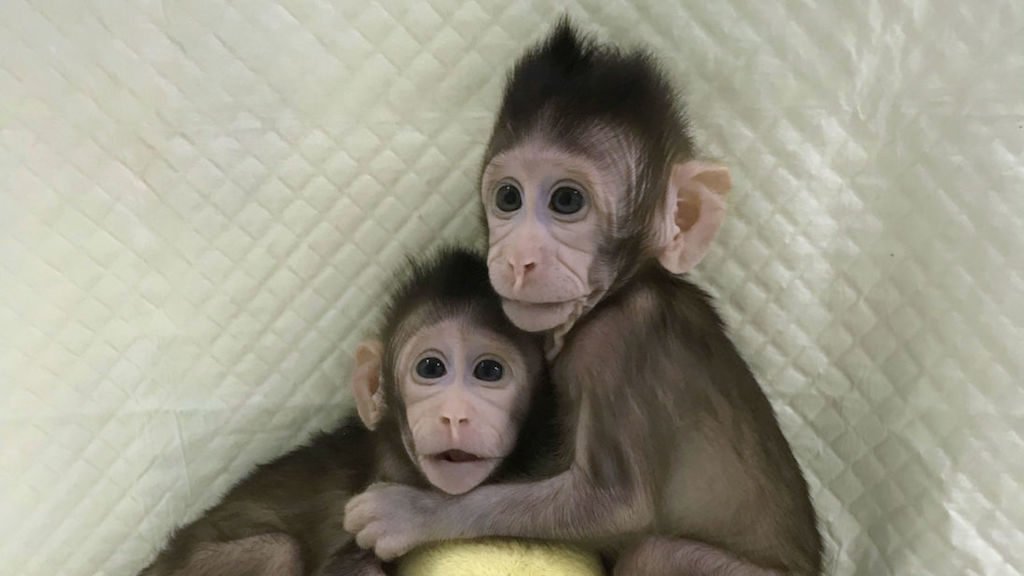China Successfully Clones Monkeys; Are Humans Next?

Scientists at the Institute of Neuroscience in Shanghai have successfully cloned two monkeys, leading to the very real prospect of cloning humans. The monkeys, Zhong Zhong and Hua Hua, were cloned with the same technique used to create Dolly the sheep in 1996.
The monkeys, two long-tailed macaques, mark the first time the order of primates have been cloned using this specific method. This essentially implies that the process of cloning a human fetus is completely possible, simultaneously opening up a deluge of ethical questions and potential for medical breakthroughs.

Chinese Academy of Sciences
Though it’s not the first time primates have technically been cloned – a rhesus macaque was produced through embryo splitting in the late 1990s – it is the first time a primate has been cloned directly from a differentiated body cell. The monkeys were cloned using a process called somatic cell nucleus transfer, in which the nucleus of an egg cell is removed and DNA from a separate body cell is inserted. Scientists can create more clones this way compared to embryo splitting.
Researchers are excited at the prospect of being able to use this technology, in conjunction with the CRISPR gene editing tool, to solve or even completely eradicate some of medicine’s most confounding diseases, including Alzheimer’s, diabetes, and cancer.
However, the moral and ethical concerns abound when it comes to safety and the prospect of designer babies. Dystopian sci-fi storylines and Black Mirror plots also come to mind when thinking about the potential applications of this technology.
In Dec. 2002, the Raëlian UFO religious group, claimed to have successfully cloned a human through its Clonaid program, headed by French chemist Brigitte Boisselier. The claim led to much contention in the media when an attorney asked the group to verify the child’s welfare in court. Despite claims that she had successfully cloned over 13 other humans, the lack of evidence from Boisselier and others in Raëlian leadership led most to believe it was a hoax.
Mites, Monsanto Cause Colony Collapse Disorder; Is Fungi A Solution?

Something has killed honey bees in droves for the past 20 years leading to what’s known as colony collapse disorder. For a while, the culprit remained ambiguous, but now scientists are discovering that a number of anthropogenic factors, including Monsanto’s herbicide glyphosate, pesticides, and parasites may be to blame. Though these may seem like disparate problems requiring complicated solutions, there is one man who believes he has an answer that could save the bees—that man is Paul Stamets, and his answer is fungi.
Over the past several years, Stamets has become something of a rockstar in the field of mycology—the study of fungi—for his radical and pioneering work discovering the endless applications and influences mushrooms have on our world.
Since he began researching fungi in the 1970s, Stamets has received 12 patents, written six books, and been recognized by a multitude of esteemed institutions. There’s even a character on Star Trek: Discovery named after him—Lt. Cmdr. Paul Stamets.
Part of Stamets’ appeal stems from his Deadhead-turned-scientist persona that views fungi from a spiritual perspective, not just a materialist lens. Stamets admits his early use of Psilocybe cubensis, also known as “magic” mushrooms, became the catalyst for his fascination, leading to a lifelong journey studying the myriad mycelia that populate the planet.
Stamets’ discoveries have changed lives and now he hopes to parlay his mushroom knowledge into a comprehensive plan to save the bees, and in the process, maybe save humanity as well.
Colony Collapse Disorder
Colony collapse disorder is the phenomenon in which there is a mass exodus of worker bees from the hive, typically dying or fleeing from infection. These bees leave their queen behind with a few nurse bees to care for her, though their chances for survival drop significantly, especially as winter draws near. Scientists have identified several factors related to colony collapse, most of which stem from pathogens and chemicals that degrade bees’ immune systems.
And while we all know bees produce honey and wax, many don’t realize just how crucial they are to our survival as a species.
Bees are pollinators, and while this may seem obvious, many are unaware of just how essential bee pollination is to agriculture. When a bee collects nectar from a plant it picks up pollen and transmits it to other plants, allowing them to bear fruit. And a single bee can pollinate up to 1000 flowers a day.
This process is necessary for our agricultural industry, as about 35 percent of our food is directly dependent on bee pollination, while the other 65 percent is indirectly dependent. If bee pollination suddenly ceased, it’s estimated around $16 billion worth of crops would be affected in the United States alone.
And over the past few decades, beekeepers and entomologists have noticed massive drop-offs in bee populations globally. In a matter of a single year, states like Oklahoma lost as much as 85 percent of beehives due to colony collapse. According to the U.S. Dept. of Agriculture, a third of all bee colonies have died each year since 2006. So, what exactly is causing this apiological pandemic?





































